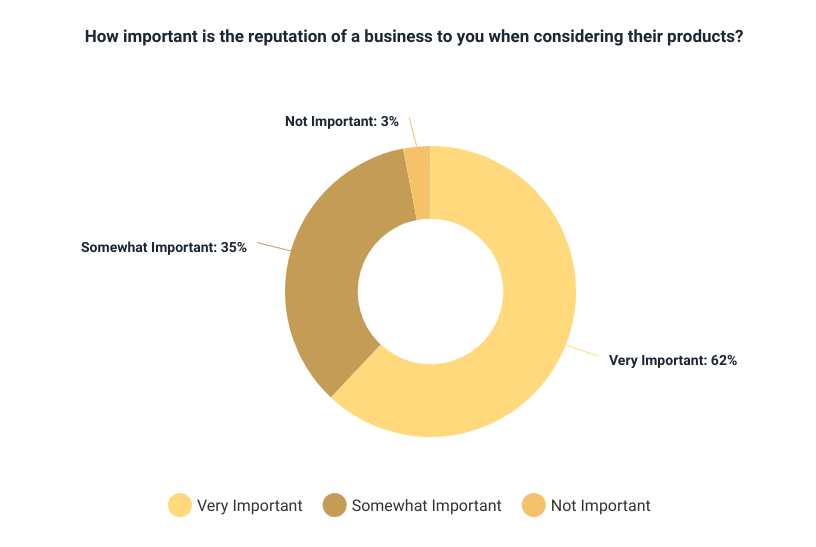Differences Between PR and Online Reputation Management
Many people think that managing online reputation and publicity are interchangeable concepts, and the two are often confused. Although they share similarities and may be used in conjunction with one another, they serve very different purposes. Consumers read an average of 7 reviews before purchasing from a business, which means mastering online PR and reputation management has become not just a strategic advantage, but a necessity.

An online reputation management (ORM) firm isn’t a public relations firm. Digital PR is usually more forward-facing and visible to members of the public. PR firms tend to be more relationship-based, whereas online reputation management firms are usually more technical and content-oriented.
ORM services usually occur behind the scenes, often quietly supporting PR campaigns in the background, and are not as obvious to casual observers. The best online reputation agencies use PR firms as a go-between with publishers while they work their magic. Think of reputation agencies as the “man behind the curtain.”
Table of Contents:
- Understanding Online Reputation Management (ORM)
- The Role of Public Relations (PR) in Reputation Management
- Comparing ORM and PR
- Case Study: Acme Corporation
- Steps for Effective Online Reputation Management
- FAQs
Understanding Online Reputation Management (ORM)
Definition of ORM
Online Reputation Management (ORM) is the strategic process of managing the online information about a person, company, or brand. The primary goal is to create a positive search landscape that accurately reflects the entity’s values and operations.
This involves monitoring online mentions, controlling the narrative through strategic content publication, and optimizing digital footprints across various platforms to ensure the first page of Google positively reflects the brand.
Importance of ORM
A brand’s online reputation is a critical component of its overall success. Effective ORM builds trust with customers, influences their purchasing decisions, and enhances brand loyalty. Given that 85% of consumers equate online reviews to personal recommendations, maintaining a positive online presence can significantly impact a business’s bottom line.
Additionally, 62% of consumers said a company’s reputation is very important to them when considering their products.

Key Activities in ORM
ORM encompasses a variety of activities including review management, social media engagement, and proactive public relations. Brands must regularly monitor and respond to online reviews, engage with customers on social media, and publish positive content to shape public perception.
Additionally, ORM involves securing customer data and addressing any negative feedback promptly to maintain a trustworthy reputation. These efforts ensure that when customers search for a business, they are met with favorable and controlled content that accurately represents the brand’s values and offerings.
The Role of Public Relations (PR) in Reputation Management
Public Relations (PR) plays a crucial role in shaping the perception of a brand in the digital landscape. PR strategies are pivotal in managing a brand’s reputation by influencing public opinion and media narratives.
Definition of PR
Public Relations involves strategic communication processes that build mutually beneficial relationships between organizations and their publics. It is an essential tool for maintaining a positive brand image, especially in crisis management scenarios.
PR Strategies for Reputation Management
Effective PR strategies for reputation management include proactive media outreach and robust crisis communication plans. Organizations should focus on maintaining consistent, transparent, and positive communication channels. Engaging with the media and stakeholders through press releases, interviews, and social media can help manage and mitigate negative perceptions. Additionally, training spokespersons and leveraging influential partnerships are vital in reinforcing a positive brand reputation.
These strategies ensure that public relations not only responds to immediate reputation issues but also proactively enhances the brand’s public image.
Comparing ORM and PR
Key Differences
Online Reputation Management (ORM) and Public Relations (PR) are often intertwined, yet they serve distinct purposes and employ different strategies. ORM primarily focuses on influencing what appears in digital search results to create a favorable online presence. This includes managing content across search engines and review sites, often through technical means such as SEO and content suppression. PR, on the other hand, aims to build and maintain a positive image through earned media, engaging directly with media professionals and stakeholders to secure coverage that enhances public perception.
ORM operates mostly behind the scenes, subtly shaping online narratives, whereas PR is more visible, dealing with public interactions and media relations. While ORM might work on rectifying online information quietly, PR professionals are actively creating and promoting stories to shape public opinion and enhance brand visibility.
Overlap and Synergy
Despite their differences, ORM and PR can effectively collaborate to bolster a brand’s overall reputation. Both disciplines aim to protect and enhance the public image of a brand, but they do so on different fronts. ORM handles the digital landscape, ensuring that search results and online content reflect positively on the brand. PR, meanwhile, focuses on relationship building and media engagement to promote a positive brand image more broadly.
Integrating ORM and PR can lead to a comprehensive strategy where each complements the other. For instance, PR campaigns can benefit from ORM’s insights into digital perceptions, while ORM strategies can be strengthened by PR’s ability to generate favorable media coverage. Together, they provide a robust approach to managing both the immediate and long-term reputation needs of a brand, ensuring consistency across all platforms and interactions.
Case Study: Acme Corporation
Acme Corporation, a leading software company, faced challenges in managing their complex database structure and maintaining a positive public image. To address these issues, they implemented an ORM solution and revamped their PR strategy.
ORM Implementation
Acme’s development team adopted an ORM framework to abstract the database layer from their application code. This allowed them to work with objects instead of writing raw SQL queries, improving code maintainability and reducing the risk of SQL injection vulnerabilities. The ORM also facilitated database schema migrations, making it easier to evolve the data model as the application grew.
PR Strategy Revamp
Recognizing the importance of public perception, Acme hired a dedicated PR team to manage their corporate communications. The team developed a comprehensive strategy that included social media engagement, press releases, and community outreach programs. They proactively addressed any negative publicity and highlighted Acme’s achievements, fostering a positive brand image and building trust with customers and stakeholders. By implementing an ORM solution and revamping their PR strategy, Acme Corporation streamlined their development processes, enhanced data security, and cultivated a favorable public reputation. These initiatives contributed to the company’s overall success and positioned them as a leader in their industry.
Steps for Effective Online Reputation Management
Monitor Online Presence
Effective online reputation management starts with vigilant monitoring of a brand’s online presence. Utilizing tools like Google Alerts, Mention, and Brandwatch, businesses can track mentions across various platforms including websites, blogs, social media, and forums. This proactive approach allows companies to stay informed about public perception and respond swiftly to any content that could impact their reputation.
Responding to Reviews
Responding to online reviews, whether positive or negative, is crucial in maintaining a brand’s image. A timely and professional response to negative feedback can mitigate damage and potentially turn a negative situation into a positive one. For positive reviews, a simple thank you can enhance customer loyalty. Platforms like Text Request streamline this process by allowing businesses to respond directly from their dashboard.
Creating Positive Content
Creating and promoting positive content is pivotal in shaping a favorable online presence. Engaging blog posts, informative videos, and compelling testimonials help suppress negative content and promote a positive image of the brand. This strategy not only enhances visibility but also strengthens the brand’s narrative across digital platforms.
Using SEO for ORM
Search Engine Optimization (SEO) plays a significant role in online reputation management. By optimizing a brand’s website and social media content with targeted keywords, businesses can ensure that positive information ranks higher in search results. This strategic placement helps dominate the digital conversation and effectively counters negative content.
FAQs
How do PR and reputation management work together in the online world?
Online PR and reputation management are pivotal to a brand’s success, working hand in hand to shape public perception. Public Relations (PR) focuses on promoting your business and its offerings, while Online Reputation Management (ORM) aims to ensure that the public holds a favorable view of your business. Together, they play a crucial role in building and maintaining a positive image for your brand online.
What steps are involved in managing a brand’s reputation online?
To effectively manage your brand’s reputation online, consider following a comprehensive Reputation Management Plan that involves:
- Conducting research, monitoring, and auditing your brand’s online reputation.
- Developing both reactive and proactive strategies for reputation management.
- Creating a guide for tone and style when responding to online comments.
- Communicating your management strategies across your organization.
- Taking appropriate actions based on the feedback, comments, and reviews your brand receives.
What are four easy tips for managing an online reputation?
Managing your online reputation can be simplified with these four strategies:
- Keep a close watch on your online presence.
- Promptly respond to all feedback, whether positive or negative.
- Encourage your customers to leave positive reviews.
- Address any negative comments in a constructive manner to mitigate their impact.
How do PR and reputation management differ?
Public Relations (PR) and reputation management serve different purposes but often overlap in their goals. PR is primarily focused on generating awareness and goodwill for a brand through various promotional activities. In contrast, reputation management is concerned with protecting and restoring a brand’s reputation if it’s been tarnished. While both functions may be carried out by different teams, especially in larger corporations, they are essential to a comprehensive strategy for maintaining a positive brand image.
About the author
Kent Campbell is the chief strategist for Reputation X, an award-winning online reputation management agency. He has over 15 years of experience with SEO, Wikipedia editing, review management, and online reputation strategy. Kent has helped celebrities, leaders, executives, and marketing professionals improve the way they are seen online. Kent writes about reputation, SEO, Wikipedia, and PR-related topics.
–
Tags: Corporate Reputation, Online Reputation Management Services, Reputation Management.
